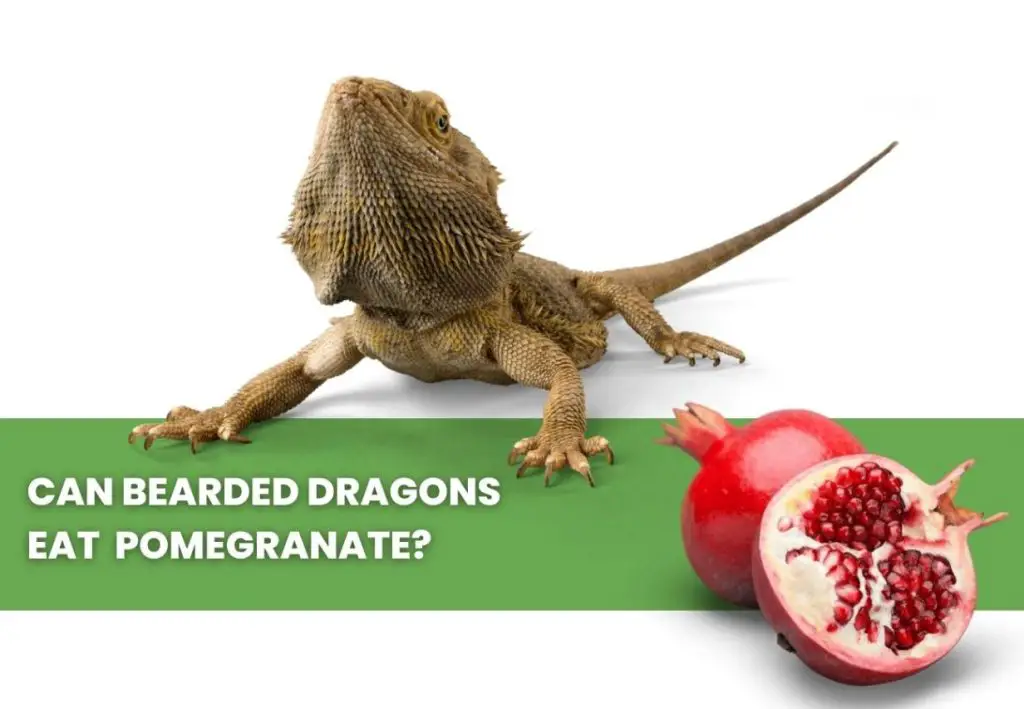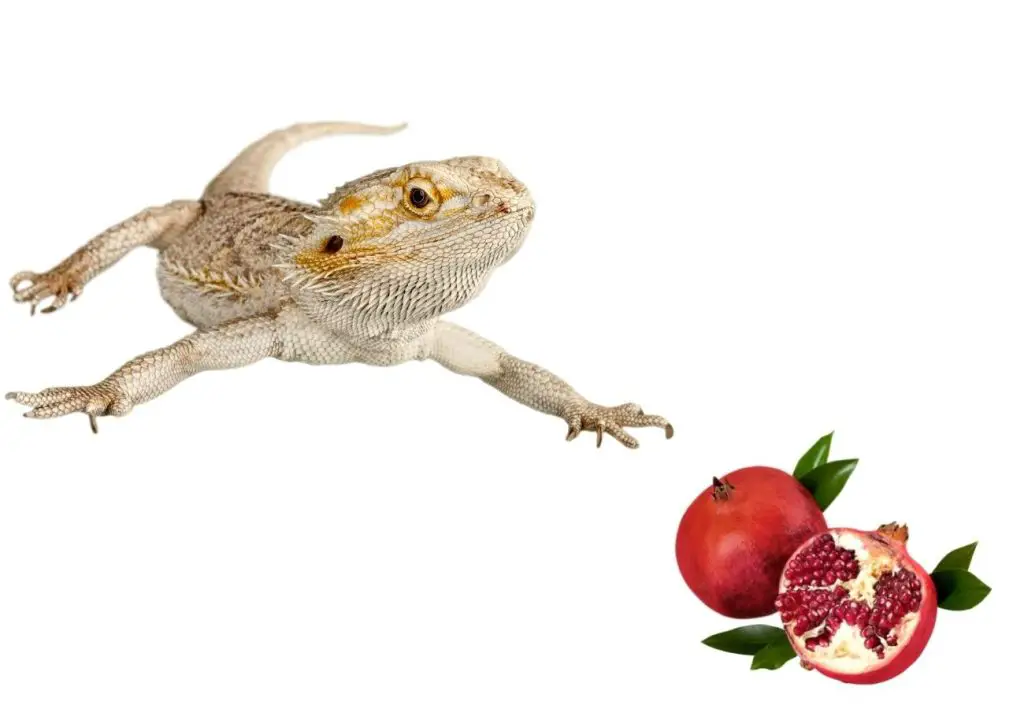
Pomegranates And Bearded Dragons – The Highs And Lows
Bearded dragons are well-known pet lizards. Apart from having live insects in their diet, they also need veggies and fruit to provide necessary vitamins and minerals.
Since bearded dragons can eat fruits, can they eat pomegranate?
The answer is yes. Bearded dragons can eat pomegranates but only occasionally, and as a rare treat. They can eat pomegranate as long as the arils are separated from the seeds.
This article will explore the nutritional value, benefits, and risks of feeding pomegranates to bearded dragons.
Nutritional Information Of Pomegranates
Nutritional Value Of 100 Grams of Pomegranates
| Nutrient Name | Amount |
| Energy | 83 Kcal |
| Carbohydrates | 18.7 g |
| Sugars | 13.67 g |
| Dietary Fiber | 4 g |
| Fat | 1.17 g |
| Protein | 1.67 g |
| Thiamine | 0.067 mg |
| Riboflavin | 0.053 mg |
| Niacin | 0.293 mg |
| Pantothenic acid | 0.377 mg |
| Vitamin B6 | 0.075 mg |
| Folate | 38 ug |
| Choline | 7.6 mg |
| Vitamin C | 10.2 mg |
| Vitamin E | 0.6 mg |
| Vitamin KCalcium | 16.4 ug |
| Calcium | 10 mg |
| Iron | 0.3 mg |
| Magnesium | 12 mg |
| Manganese | 0.119 mg |
| Phosphorus | 36 mg |
| Potassium | 236 mg |
| Sodium | 3 mg |
From the above table, we can see that there are beneficial and harmful nutrients in pomegranate.
Health Benefits Of Feeding Your Beardie Pomegranate

It’s Very Healthy
Some bearded dragon owners consider pomegranates nutrition enriched fruit option for bearded dragons because they contain favorable vitamins and nutrients that are essential for a beardie to stay healthy.
Contains Vitamin A And C
Vitamin A and Vitamin C are the two most needed vitamins for a bearded dragon. They are the key to a healthy immune system. Vitamin A and Vitamin C also help improve the vision, reproduction, and growth of bearded dragons.
Potassium
Pomegranates are a good source of potassium for bearded dragons
Bearded dragons require potassium in a favorable percentage because potassium is the mineral they need to control blood pressure and maintain a healthy nervous system.
The potassium from eating pomegranates helps them keep their muscles healthy.
Magnesium
Pomegranates have a moderate level of magnesium that helps bearded dragons maintain their muscle and brain functions.
Contains Calcium
Calcium is a needed element for bearded dragons’ overall health, and bones and pomegranates have a fair amount of calcium.
Risks Of Feeding Bearded Dragons Pomegranate
Pomegranate has too much sugar and oxalates for bearded dragons. They should eat only a small amount of pomegranate. Health risks include:
High In Sugar
Pomegranate has a high sugar content which may lead to diabetes, obesity, and tooth decay.
Disproportionate Calcium to Phosphorus Ratio
The calcium to phosphorus ratio is important. Phosphorus and calcium need to be given in equal amounts. A ratio from 1:1 to 2:1 is ideal.
As you can see from the table, the calcium to phosphorus ratio is disproportionate.
High phosphorus levels bind with the calcium and prevent it from being absorbed in your bearded dragon’s bloodstream, resulting in calcium deficiency.
If dragons’ bodies become calcium deficient, they start pulling calcium from their bones, causing metabolic bone disease (MBD). MBD is a common disease with domestic bearded dragons but is easily preventable with proper diet and care.
Metabolic bone disease is a painful skeletal disorder caused by a lack of calcium. It causes severe bone, muscle, and tissue damage, which could result in paralysis or death.
Too Much Oxalates
Oxalates also deplete the supply of calcium to bearded dragons and can have adverse effects on their bones.
As with phosphorus, oxalates bind with calcium and prevent it from absorbing into the bearded dragon’s bloodstream.
When there are moderate oxalates, a bearded dragon can develop joint problems, which can cause Metabolic Bone Disease (MBD).
MBD may cause problems with bone development, mobility, lethargy, and eventual paralysis or death.
Can A Baby Bearded Dragon Eat Pomegranate?
Pomegranates make a healthy addition to a baby beardies’ diet. Consuming pomegranates in a moderate amount can fulfill their need for necessary vitamins and nutrients.
These vitamins and nutrients can increase the growth rate of baby bearded dragons and strengthen their vision and immune system.
Baby bearded dragons require a balanced diet of insects and veggies along with pomegranates or other fruits. The best insects to feed your bearded dragon are live feeders such as crickets and plant material to help them experience total growth during their growing period and maintain good health.
Adult bearded dragons, like baby bearded dragons, cannot have too many pomegranates in their diet. They should not eat pomegranates every day as they have high sugar levels, which can cause obesity, fatigue, lethargy, and diabetes.
Can Bearded Dragons Eat Pomegranate Seeds?
Do not feed pomegranate seeds to your bearded dragon. You should only provide pomegranate arils separated from the seeds.
However, if a bearded dragon accidentally eats a few pomegranate seeds, it is harmless. But they should not be eating more pomegranate seeds.
Pomegranate seeds have antioxidants, so moderate amounts may be good for your bearded dragon’s immune system.
How Often Can Bearded Dragons Eat Pomegranate?

Pomegranates are not the first recommended fruit option for a dragon’s daily diet. However, they are considered safe for bearded dragons to eat in moderation.
How to Feed Pomegranates To A Bearded Dragon
The only way you should feed pomegranates to your bearded dragon is to separate the pomegranate arils (seed pods inside the pomegranate) from the seeds
Wrapping Up
Pomegranate, while nutritious, can only be eaten by bearded dragons as an occasional treat. A bearded dragon should eat the separated arils of pomegranate from the seeds.
Continually research new food you wish to introduce into your bearded dragon’s diet because even healthy food can have side effects. If you remain unsure, please contact your vet for advice.
Continue to read our main article “What do Bearded Dragons Eat?” for all the ins and outs on general diet questions, and get a further detailed breakdown of other popular foods in the articles below:
